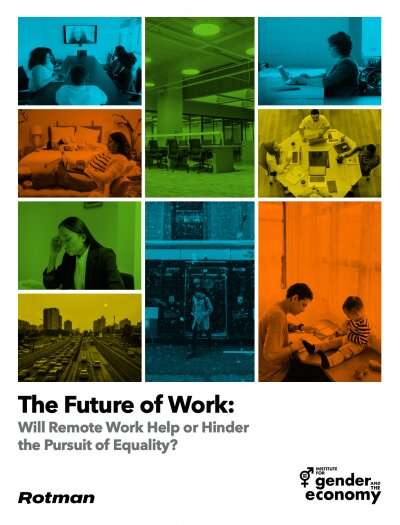Remote work and the pursuit of equality

The shift to remote working in March 2020 caused by the COVID-19 pandemic has raised many questions on the future of work. A new report looks at who has benefited from remote and hybrid work models and what organizations and governments can do to ensure those currently disadvantaged by the current models can also benefit.
The report, from the Institute for Gender and the Economy (GATE) at the University of Toronto's Rotman School of Management, says that remote work and hybrid models have improved many workers' lives, but they have also been associated with career penalties, work-family conflict, higher stress, and other mental health challenges—particularly for those who already experience inequity. Many of these disadvantages come about not because of anything inherent about remote work but because of bias, stereotypes, and social norms surrounding paid and unpaid work.
The report found that the ability to work remotely disproportionately belongs to higher-income, white-collar workers who are predominantly white and male. Those with poor access to housing and high-speed internet or who experience unsafe situations such as domestic violence cannot readily work remotely.
Primary caregivers, who tend to be women, may particularly experience an erosion of boundaries between work and care responsibilities while working from home, leading to an unsustainable amount of paid and unpaid work.
For others the opportunity to work remotely increases economic opportunity by allowing caregivers to remain in the workforce and allowing workers to move to less expensive regions. However, women and racialized people tend to experience disproportionate stigma and bias for using them, resulting in significant career penalties such as wage reductions and fewer promotions.
Such issues with working remotely suggests the need for remote-work policies that support both equity and well-being and that aim to mitigate bias and other structural disadvantages for remote workers. Public policies such as affordable childcare, adequate paid family leave, and a range of options for flexible work can facilitate more egalitarian relationships and households. Both workers and organizations benefit from policies that remove stigma of remote work because it increases worker motivation and job performance.
Flexible work stigma can also be reduced by ensuring information is accessible online, and creating team-building opportunities for hybrid- and remote-working employees. Organizational initiatives can decrease work-family conflict, such as by ensuring reliable and consistent communication to all employees, establishing that workers know they do not have to work longer hours at home, and eliminating employee monitoring.
The report was written by; Kim de Laat, an assistant Professor of organization and human behavior at the University of Waterloo's Stratford School of Interaction Design and Business and a former post doctoral fellow at GATE; Carmina Ravanera, a senior research associate at GATE; and, Sarah Kaplan, Distinguished Professor of Gender & the Economy, and Professor of Strategic Management, and director of GATE.
More information: The report is online at www.gendereconomy.org/the-future-of-work.
Provided by University of Toronto




















